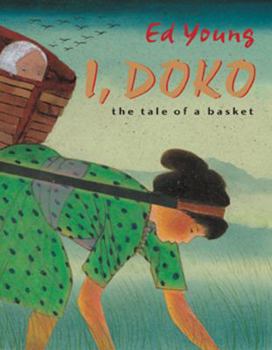I, Doko: The Tale of a Basket
Select Format
Select Condition 
Book Overview
Doko is only a simple basket. It is not only grain from the field that he carries--he has also carried his master's child, and wood for the fire. He was there when the child became a man and married. And he very nearly had to carry the grandfather away forever. Luckily, someone wise beyond their years spoke up and made it possible for Doko to carry the grandfather home again instead. As ever, Ed Young has taken a simple fable and made it into a masterpiece...
Format:Hardcover
Language:English
ISBN:0399236252
ISBN13:9780399236259
Release Date:November 2004
Publisher:Philomel Books
Length:32 Pages
Weight:1.05 lbs.
Dimensions:0.4" x 8.8" x 11.2"
Age Range:5 to 8 years
Grade Range:Preschool to Grade 3
Customer Reviews
3 ratings
Ms. MacInnis' Third Grade Class
Published by Thriftbooks.com User , 17 years ago
The story is about a basket, boy and his grandfather. The basket was used for many things. We liked when the young boy told his father to return the basket. We learned that everytone should be respectful and nice to older people.
loyalty, respect for elders
Published by Thriftbooks.com User , 18 years ago
Surprise ending. Very good book with common Asian theme of respecting elders.
Where are we going and why am I in this handbasket?
Published by Thriftbooks.com User , 19 years ago
This is what I like about Ed Young. You never know what the heck he's gonna do next. Some authors, like Demi, have a single style and do not waver from it, come hell or high water. Mr. Young is different. Some days he feels like doing a picture book full of colorful blind mice. Other days he's more interested in retelling of Little Red Riding Hood but in a Chinese vein. He is also, I must add, an inconsistent creator. He's just as likely to produce a stunning, "Lon Po Po" as he is a dreadful "Turkey Girl" or a so-so, "Sons of the Dragon King". To be frank, this is what I like about him. Young's unpredictable. A loose canon. I was, therefore, delighted to pick up "I, Doko". I knew it was an unusual offering, but also just as likely to be stunning as ridiculous. After a quick read, I can state with zero hesitation that this book falls squarely into the "stunning" camp. Young may not know where his next book is going to lead him, but if it's anywhere near the direction you find in "I, Doko", he'll be doing well. The book is told from the point of view of a basket or "doko". In Nepal, this doko explains its role in a family's life. It is bought by its master, Yeh-yeh and used to carry babies, food, kindling wood, and eventually Yeh-yeh's deceased wife Nei-nei. Yeh-yeh has a son who grows quickly into a man and who starts his own family. The doko reports happy occasions like weddings and births in which it plays a special part. Unfortunately Yeh-yeh is growing old and can no longer help in the fields. He spends his time instead growing close to his grandson Wangal. One day, Wangal and Yeh-yeh overhear Wangal's father (Yeh-yeh's son) telling his wife that the next day he will leave his aging father on the nearest temple steps so that the priests can take care of him from now on. The grandfather and grandson (and basket) are distraught at this news but can think of no way to save Yeh-yeh. The next morning, the doko carries Yeh-yeh on his son's back to the temple when Wangal asks his father to be sure to bring the doko back. When asked why he replies that when it is time for HIS father to be put on the temple steps, the basket will again prove useful. Stunned, the father brings Yeh-yeh home again and, "Wangal's love and respect for his grandfather inspired and transformed the whole village in how to treat elders". I can see farsighted grandparents already purchasing this book for their wide-eyed grandchildren in the hopes that the modern equivalent of the temple steps (i.e. nursing homes) be avoided as a result. In a little note at the beginning of the book, Young states that this book was, "Adapted from a folktale appearing in various forms in Nepal and in many other Asian countries, most often conveyed in the oral vernacular". You may rest assured that this translation from an oral tale into the written word has not suffered the text one jot. Young writes this story with a steady hand and the fact that we are hearing thi





